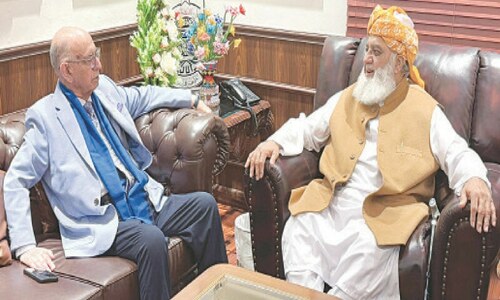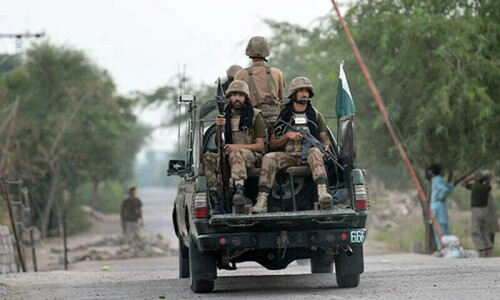THE Australian elections today may not make global headlines, but as any Australia-watcher will tell you, politics ‘down under’ is dramatic, passionate and almost Shakespearian in its endless narrative of unexpected betrayal, ruthlessness, revenge and the search for redemption.
Today’s contest is between incumbent Prime Minister Kevin Rudd from the Labour Party and Tony Abbott, leader of the opposition Liberal-National coalition.
Reports in the Australian media point to a tough battle between the two men and to an even tougher and continuing saga of hate and revenge between Rudd and Julia Gillard, the former Labour prime minister who Rudd unceremoniously — and very dramatically — kicked out of office in June this year.
Not many tears were shed for Ms Gillard since she had played a similar dirty trick on Mr Rudd in June 2010. Australian politics, it can be said, leaves Bollywood drama in the shade.
Rudd is arguably Australia’s best known politician, much admired abroad but increasingly unpopular at home. I’ve seen him in action at press conferences and meetings and he is a truly global politician, articulate, witty and of course he speaks Mandarin.
But, Australians tell me he is also rude, arrogant and a terrible boss. Go figure.
Clearly, I’m hooked on what happens in Australia. I think I always have been: as a child, I was intrigued by stories of boatloads of European criminals and other societal rejects arriving in Australia to people the vast land.
I was shocked by the ‘White Australia’ policy which limited immigration into the country from a select group of countries and was fully eliminated only in 1973 by the Labour government. Books I read spoke of rampant discrimination against the Aborigines.
Then suddenly as the winds of change swept through the vast land, there were years of uninterrupted good news from Australia: an embrace of multiculturalism, official apologies to the Aborigines and a determined bid to become an integral part of Asia.
The country continues to fascinate me although in some respects it does seem like the bad times may be back.
As Jane McAdam of the University of New South Wales points out, one of the key topics in the current elections concerns asylum-seekers and refugees, with both major parties engaged in a race to the bottom about how best to shut down Australia as a place of refuge for people who take to the sea.
Many of the country’s’ initiatives including the mandatory detention for all unlawful arrivals, the excision of the whole Australian mainland from Australia’s migration zone, the removal of boat arrivals to offshore processing centres in small Pacific island countries, with no prospect for resettlement in Australia, are against the spirit of international law, says Ms McAdam.
And as she points out, such measures are surprising in a country as wealthy, multicultural and big as Australia.
The fury being unleashed by politicians against the “huddled masses” seeking shelter in Australia is very disappointing of course. But there is more to the country than muddled asylum policies.
The Australian economy may not be growing as fast as it did in recent years but its steady 2.6pc GDP growth rates for the year are still higher than for any other developed nation.
In any case, Australia today is a far cry from the 1980s when Lee Kuan Yew, the outspoken former prime minister of Singapore, warned that the country was living way beyond its means and in danger of becoming the “poor white trash” of Asia.
Gone also are the days when Malaysia’s former prime minister Mahathir Mohamad refused to accept Australian membership of Asian groupings because, as he insisted, “They are Europeans, they cannot be Asians”.
The feisty Malaysian leader may not have changed his mind, but his successors certainly have — as have all other Asian countries, including China.
Over recent years Australia has impressed me and others by making a determined bid to become a serious player in the Asia-Pacific — or the Indo-Pacific as the Australians describe the region. Analysts say Australia is pulling its weight as a global middle power and also a southern hemisphere power.
As Benjamin Reilly of Murdoch University underlines, “While engagement with East Asia and the United States remains the main game, Australian ‘soft power’ is increasing across the globe’s southern segment in a range of areas, from aid and trade to scientific research to peacekeeping”.
Significantly, the G20 summit in 2014 will be held in Brisbane. Here in Brussels, it’s been fascinating to see Australia’s role in promoting stronger European Union engagement with Asia.
Australia along with New Zealand — another country which deserves more global attention — joined the Asia Europe Meetings in 2010, many years after their application. Their membership certainly helped to increase the credibility of ASEM and bring new perspectives into the club.
In recent months, Australia has published a voluminous white paper on its Asian connections, urging students to learn more Asian languages, including of course Chinese.
Relations with China may be volatile but exports of raw materials to the country have kept the Australian economy on an even keel.
Significantly, like Mr Rudd, Mr Abbott has underlined that Asia will be his top foreign policy priority if he wins office.
The man expected to be Australia’s future premier said recently his first travel priorities would be Indonesia, China, Japan and South Korea, rather than traditional and long-standing allies like the US and Britain.
Not surprisingly, while the rest of the world may not care too much, Asian policymakers will be watching Australian elections very carefully.
The writer is Dawn’s correspondent in Brussels.











































